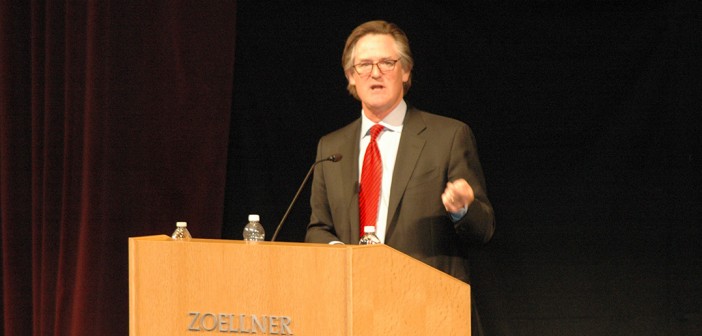With the use of Twitter having the power to take down a government, Paul H. Stebbins, executive chairman of World Fuel Services Corporations, believes in the power of U.S. citizens when it comes to involvement in the government.
During his speech at Lehigh on Nov. 4., Stebbins urged Lehigh students to be part of the solution to economic issues and make their voices heard by the government. Stebbins speech was one of the Segal ’67 Distinguished Lectures of the College of Business and Economics.
Political dysfunction is among the greatest reasons why the economy has not been able to bounce back since the crash in 2008, Stebbins said. Topics such as social security, health insurance, interest rates and tax cuts have become “politically toxic” and avoided like the plague. Politicians are not discussing the most important issues and possible solutions due to the risk to their careers that comes with addressing them.
“(The national debt is a) cancer that eats at the very foundation that keeps this country thriving,” Stebbins said.
It is not only a problem that government officials or the controllers of the top 1 percent of the country should be dealing with, but also one that is affecting everyday people in the competitions for jobs and resources. Stebbins said that if the debt is left alone, by 2030 the debt to GDP ratio will be at 100 percent, and by 2050 it will be 200 percent, which would be catastrophic.
The topic most avoided within the problem of the national debt is Social Security. When Social Security was created, the age at which someone is able to start receiving funds was 65. This remains the same today. The main difference is that when Social Security was created, the life expectancy was 63, and now it spans into the late 70s and 80s, leading to a larger chunk of the budget than expected being used for social security purposes.
Another problem with the economy is the idea of the “American dream.” Stebbins admits that it is businessmen like him, the top 1 percent who chased the “American dream” and obtained it, that have contributed to the dilemma the country now faces. But for a generation of students like those at Lehigh, this dream is still the goal.
“My people originated from the Caribbean,”said Marcus Pierre, a student present at the lecture. “As a first-generation American, I feel I owe it to them to go for the ‘American dream,’ especially after they paid for my college and worked to send me (to Lehigh).”
Stebbins said that the problems will not be fixed overnight, but it is the citizens — the everyday people — who will make the strides to fix the economy if they make their voices heard. He urged people to call congressmen and to use online tools and websites that allow citizens to ‘play king’ for a day to see how they would fix the economy if they had the opportunity.
“It’s important to understand the issues and understand the circumstances around the issues,” said Georgette Chapman Phillips, dean of the College of Business and Economics, in her welcoming speech.






Comment policy
Comments posted to The Brown and White website are reviewed by a moderator before being approved. Incendiary speech or harassing language, including comments targeted at individuals, may be deemed unacceptable and not published. Spam and other soliciting will also be declined.
The Brown and White also reserves the right to not publish entirely anonymous comments.